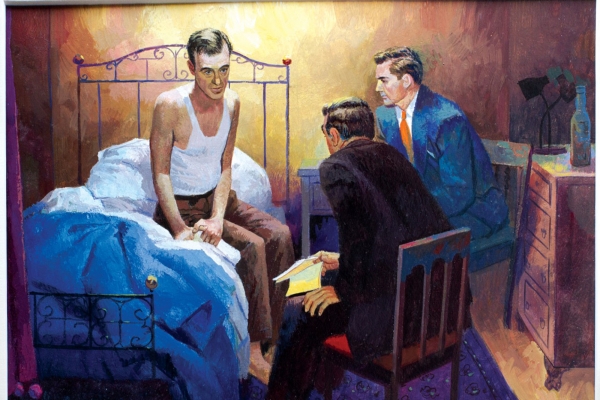August 2002
Forever Nonprofessional
TRADITION EIGHT
TRADITION EIGHT
Paul C., Oceanside, California
August, 2002
Alcoholics Anonymous should remain forever nonprofessional. We Define professionalism as the occupation of counseling alcoholics for fees or hire. But we may employ alcoholics where they are going to perform those services for which we might otherwise have to engage nonalcoholics. Such special services may be well recompensed. But our usual AA Twelfth Step work is never to be paid for.
--Long form of Tradition Eight
Twelve Steps and Twelve Traditions
The Eighth Tradition suggests that AA remain forever nonprofessional, not that AA members can’t be professionals.
Early in my recovery a friend and I drove to a cheap motel to visit a drunk on a Twelfth-Step call. After a few hours, this very intoxicated man pulled out a big wad of large denomination bills and began peeling them, off, one by one, into a pile in front of us. Astonished, I asked him what he was doing. His slurred response was, ’You’ve been very kind. I want to pay you for your time." My friend informed him that he couldn’t buy what we have in Alcoholics Anonymous. I hadn’t yet heard of our Eighth Tradition of nonprofessionalism, yet here was a stark example right in front of me.
When I came into AA, I was relieved to find that no one was being paid to talk to me, give me rides to meetings, buy me coffee, or help me work the Steps. Professionals had tried valiantly to help me, but I had a huge chip on my shoulder and was unresponsive to their efforts. I was glad to discover that AA didn’t have a special class of twelfth-steppers or sponsors.
Upon joining AA, I attended lots of meetings and events, read the literature, worked the Steps with my sponsor, began sponsoring other men, and became involved in intergroups and general service activity. Later, I received extensive training in alcoholism counseling and got a master’s degree in social work. Now, some twenty-seven years later, I am a social worker with many years of experience working in alcoholism treatment programs, jails, child protective services, medical facilities, employee assistance programs, and the private practice of psychotherapy. When my friends in AA ask me if I work with alcoholics professionally, I smile and tell them that you can’t he a social worker without dealing with alcoholics.
When I entered the alcoholism treatment field, the main issue for me was how to keep my professional role distinct from my AA membership. I received a lot of help from the General Service Office guidelines, "For Members Employed in the Alcoholism Field." I’ve taken special care to develop some practical strategies to maintain this distinction.
For example, when I speak publicly about alcoholism or AA--at a professional gathering or to the media--I don’t reveal my membership in AA. When I speak as an AA member--at my home group meeting, an AA convention, or to the media on an AA public information assignment--I don’t mention my profession. Maintaining the distinction minimizes the possibility of confusion for the public, other AA members, and me.
Occasionally, AA members ask me "to write letters to court on their behalf. First, I clarify which type of letter is being requested. One is on letterhead, and I sign it as a social worker; and my AA membership isn’t mentioned. The other is on plain paper, and I sign it as an AA member; my profession isn’t mentioned.
I don’t give my business card to newcomers. It just scares them. Besides, to give an alcoholism counseling or psychotherapy business card to a newcomer at an AA meeting might create the impression that I’m trying to recruit new patients from AA. Nothing could be worse for me, and it wouldn’t be too great for the newcomer either. So I had a personal card printed with my name, address, and phone number--no titles, degrees, licenses, certifications, professional designations, or academic affiliations--and this is what I give to new AA members. This practice helps keep me focused on AA’s primary purpose and keeps me centered on why I’m at an AA meeting in the first place. It’s as much for my protection as it is for the newcomer’s.
Being an AA member and working in the alcoholism field can be a little awkward at times. At an AA meeting one night, a young man celebrated his one-year sobriety anniversary by thanking his alcoholism counselor by name--me. I took him aside after the meeting and explained that I attend AA meetings as an AA member, not as an alcoholism counselor, for my own recovery. He quickly grasped my point and was most gracious about it.
Another time, I worked extensively with a company’s top management team to effect the hospitalization of a valuable executive sorely in need of alcoholism treatment One night the treatment center unknowingly bused him to an AA meeting where I was to be the main speaker. When I saw him enter the room a few minutes before the meeting started, I explained to him the difference between the two roles. Everything proceeded smoothly from there. (He retired a few years later and the end of his career was sober and successful.)
One evening a couple came to my office for consultation on a troublesome marital issue. They were AA members and they had an audiotape of a talk I had given at an AA convention, which they listened to over and over again. They knew more about my story than I did! They had way too much information on my personal life for me to provide effective psychotherapy of the type they needed. I referred them to a colleague who could serve them better.
I attended many AA meetings with a fellow AA member, a Catholic priest, who was nationally known for his spiritual counseling of alcoholics. He never wore his clerical garb to AA meetings, wanting to be just another AA member, and he always introduced himself just by his first name when he spoke at meetings, inevitably, though, part way through the meeting, the chairman would ask, "Father, would you say a few words?" It’s true that some alcoholism professionals seek too much of the limelight in AA. It’s also true that sometimes other AA members won’t let alcoholism professionals just be alcoholics at AA meetings.
Of course, I don’t sponsor my patients, nor do I offer alcoholism counseling or psychotherapy to the men I sponsor. When AA members in my group approach me to provide alcoholism counseling or psychotherapy, I diplomatically refer them to colleagues. It’s unethical to provide such services to those with whom one has a close relationship.
I’m grateful for that last point, because otherwise not only would I not have a place to go, but neither would the alcoholic colleagues I’ve twelfth-stepped over the years. One social worker in an occupational alcoholism program sobered up and joined AA after he told me of his problems with drinking and I invited him to meet with a group of mental health professionals in AA. Another therapist told me it seemed prudent to join AA when his hangovers interfered with the family counseling he was conducting in an alcoholism treatment program. I once hospitalized a marriage and family counselor on a Twelfth-Step call when he began bleeding from all the wrong places. He had earlier been arrested for drinking and driving, which was especially ironic since he was an instructor in an alcoholism studies program and taught classes for DUI offenders at the time. I’m grateful that AA was secure enough in its primary purpose to absorb my sick colleagues.
I don’t think that AA members who are employed as ethical, properly trained alcoholism counselors return to drinking any more frequently than the rest of the AA population. But if they do drink, the news often travels more quickly due to their heightened visibility in the AA community. I do know that the only thing worse than trying to twelfth-step someone with a head full of AA and a belly full of booze is trying to twelfth-step someone with a head full of professional alcoholism knowledge and a belly full of booze. These folks need the same compassion, patience, and love as other AA members.
A friend of mine is a psychologist who has been sober in AA for over twenty-five years. He is a tenured professor at a fine university and has an impressive string of publications in prestigious journals of medicine, psychology, and addiction. He has shown me that great intellect and professional accomplishment are compatible with humility, as long as humility comes first. Like him, I try to approach AA as an alcoholic who desperately needs its healing, action-oriented spirituality, not as an egghead who has been educated beyond his intelligence and thinks he’s immune to drinking again. I’ve met a lot of people too smart to join AA. I’ve never met anyone too dumb.
Throughout all my years in AA and the alcoholism treatment field, I’ve never kidded myself that alcoholism counseling, psychotherapy, or social work is a substitute for AA involvement. Fortunately, the vast majority of AA members I know who are employed in the alcoholism field lead happy, healthy, productive, balanced lives. They take good care of themselves and therefore they can take good care of their patients and can be available to the people they sponsor. AA members--some of whom are my colleagues--show me how and when to distinguish between my professional role and my AA membership. I’m grateful for their example of how to apply the Eighth Tradition in my everyday life. After all, you can’t buy what we have in Alcoholics Anonymous.
Need help with customer service?
Call 800 631-6025 (English), 800 640-8781 (Spanish), 212-870-3456 (French) or email: [email protected]
or [email protected]





